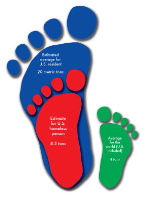Turns out it's harder to be green when you have a lot of green

Turns out there's some truth to that phrase "filthy rich," at least when it comes to your environmental footprint.
Web site TGDaily reports today about a new study from the Massachusetts Institute of Technology that proves (surprise, surprise) that your typical billionaire like tech titan Bill Gates or media mega-star Oprah Winfrey contributes a bigger carbon footprint than your average, say, homeless person. Here's their story.
Actually, according to the MIT research, the average American contributes twice as many carbon emissions to the atmosphere as the global average. The average carbon footprint is approximately 20 metric tons, and it's tough for a U.S. citizen to reduce that footprint to much below 8.5 metric tons, the study found. Here are some more details from the university's news office.
The great graphic above by Patrick Gillooly shows the different footprints for the populations considered. The big blue foot represents the impact of many Americans (20 metric tons); the red foot represents the carbon impact of a U.S. homeless person (8.5 metric tons); and the green footprint represents the world average (4 metric tons).
The research was actually conducted as part of a mechanical engineering class, one that will be continued next semester. That class will work on better quantifying specific ways that you can individually green-up your lifestyle. It shouldn't surprise you that the travel sector will be in for some scrutiny.
Ironically, it was only months ago that many nay-sayers thoughts thought that living a green lifestyle was something that only the privileged among us could afford. For the sake of us all, I'm hoping that assumption turns out to be wrong. Or we're all going to be in big trouble.
